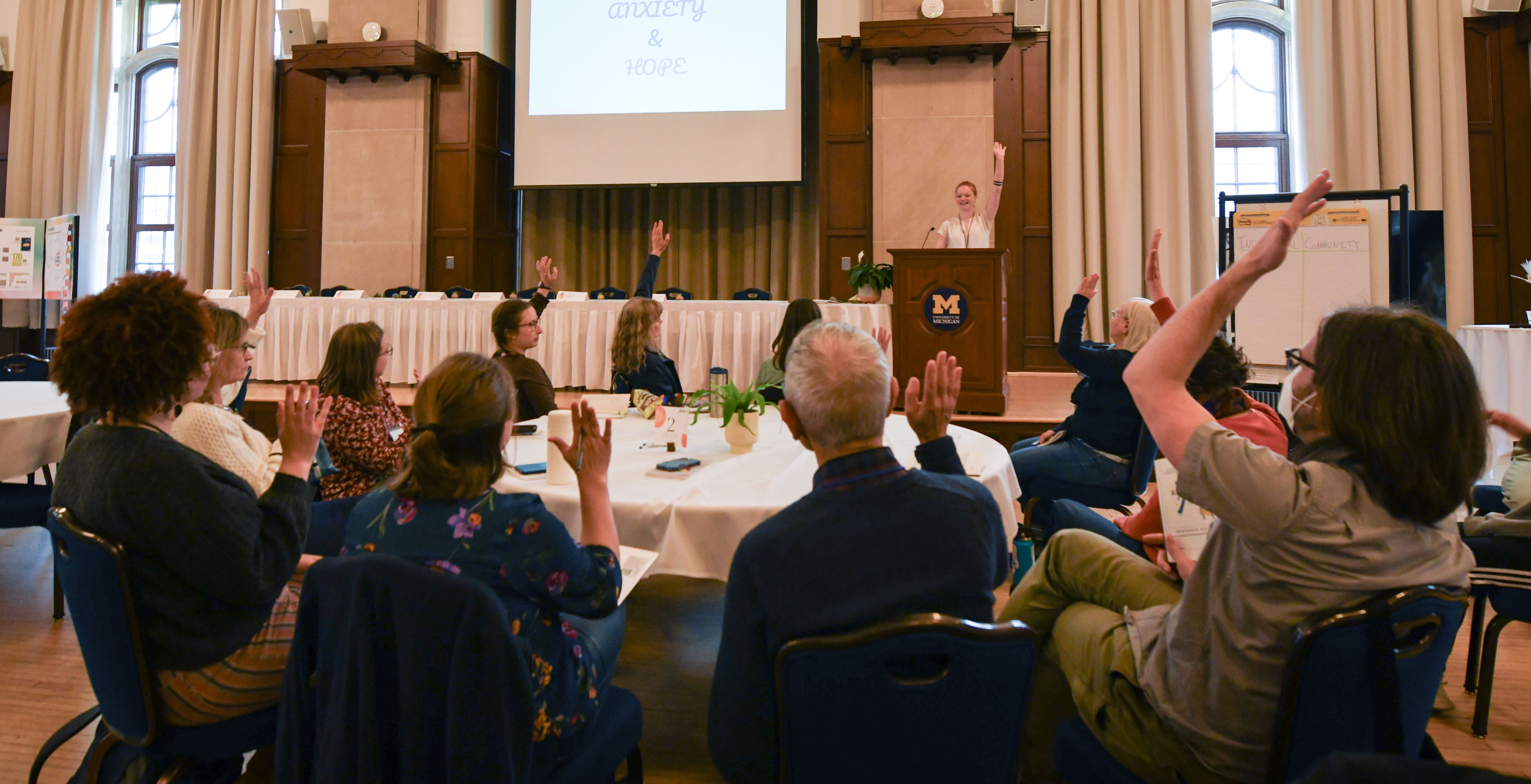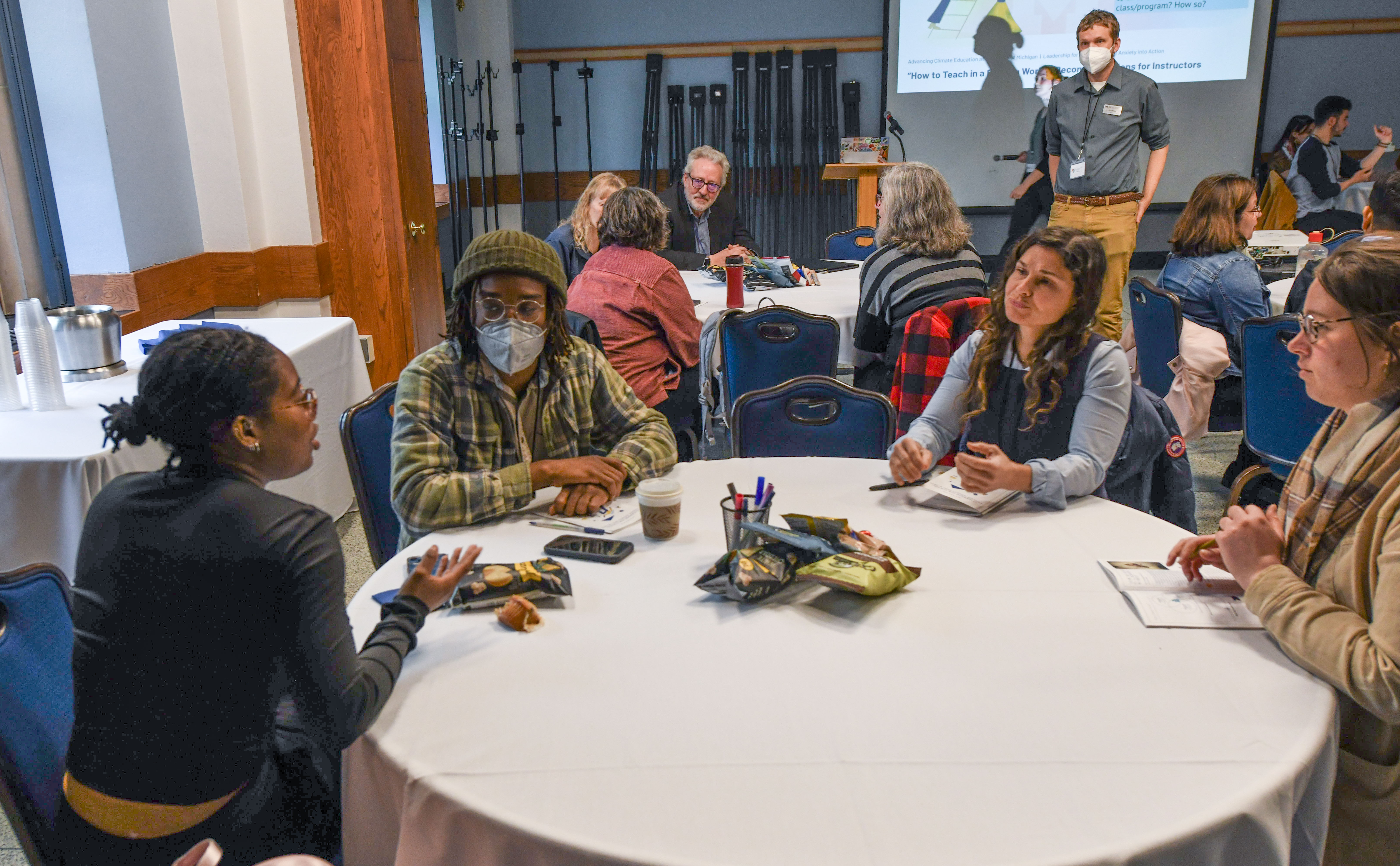
 back to all news
back to all news
U-M students organize conference exploring ways to turn climate anxiety into action

University of Michigan students in the “Leadership for Turning Climate Anxiety into Action” seminar at the School for Environment and Sustainability (SEAS) organized the Advancing Climate Education (ACE 2.0) event, which brought together around 100 U-M students, faculty and staff interested in learning about turning climate anxiety into action.
The two-day event, which took place April 10-11, 2024, aimed to help participants leverage their climate emotions to motivate them to engage in lifelong individual and collective actions toward creating a sustainable and just future.
ACE 2.0 kicked off with interactive learning activities and networking before announcing the results of a competition that invited U-M students to explore and find an outlet for translating their climate emotions through creative means.
The winners, all students from different units across campus, received cash prizes, with Jungeun Seo taking first place for her plate set made solely of used waste. The other winners were Daphne Matter, who created a 3D interactive collage made into a recycling box; Salem Loucks, who contributed a poem; and Chloe Yoo, who converted 1,000 plastic bottle caps into three pieces of art.
Following the awards, Sarah Jaquette Ray, a professor at Cal Poly Humboldt and author of “A Field Guide to Climate Anxiety: How to Keep Your Cool on a Warming Planet,” gave a keynote address in which she discussed the importance of considering emotions in climate education, sharing best practices for instructors to center emotions in the classroom.
"I have noticed that, in college classrooms, there's a lot of faculty who have very, very little awareness about emotional intelligence and how to center student emotions in their work," Ray said.
She explained that, compared with feelings of guilt or shame for how actions negatively impact the planet, having pleasure, community and a sense of purpose were more likely to determine how people act in the long run.
"What are the emotional skills that students need to not just save the world as we hope they might, but also to get up, come to school, come to classes and then to do this work and engage in this work for the long haul?” Ray said.
The second day of the event kicked off with remarks by U-M’s Provost, Laurie McCauley, who emphasized the importance of addressing climate-related anxiety. She said that as U-M strives to prepare the next generation of climate leaders, it’s important to recognize that students face increasing uncertainties in the future.

Citing a recent survey assessing student feelings about climate change, McCauley shared statistics illustrating the importance of discussing how climate change impacts mental health.
“A recent U-M Healthy Minds survey, conducted just this past fall, assessed our students’ feelings about climate change and found that because of climate change, 40% of students reported feeling nervous, anxious, or on edge, 24% reported feeling down, depressed, or hopeless, 22% reported not being able to stop worrying about it and 60% think the future is frightening.”
She continued, “It’s imperative that we empower students with the skills to face the future without burning out. It’s essential we instill in them the confidence that they can make real lasting changes.”
After McCauley’s remarks, SEAS Professor and Dean for Academic Affairs Michaela Zint, who leads the ACE effort and co-teaches the “Leadership for Turning Climate Anxiety into Action” class, introduced Taylor Valentine, a second-year SEAS graduate student who is part of the ACE leadership team and also serves on the U-M Sustainability Student Advisory Board.
Valentine moderated a panel of six U-M students, which addressed a range of topics from emotions felt due to climate change to recommendations for a path forward based on what has been learned during their time in the seminar.
When discussing climate change-related emotions, Tim Muhich, a PhD candidate at SEAS, said, “The more I involve myself in working towards a better world, the more hopeful I’m becoming because I’m seeing more and more hard work from a lot of people like everyone who is here.”

Following the panel, attendees were directed to concurrent sessions, where they engaged in discussion on the following topics:
- How to keep your cool on a warming planet: Recommendations for managing climate anxiety
- How to teach in a burning world: Recommendations for instructors
- The U-M Climate Collective: Toward a culture of climate resilience
- Climbing out of the doom spiral: Balancing climate anxiety and hope
- Zombies and the climate crisis: Using storytelling to change the game
This year’s event builds on the work started at ACE 1.0 in 2023, which focused on the importance of advancing climate education across the U-M campus.

